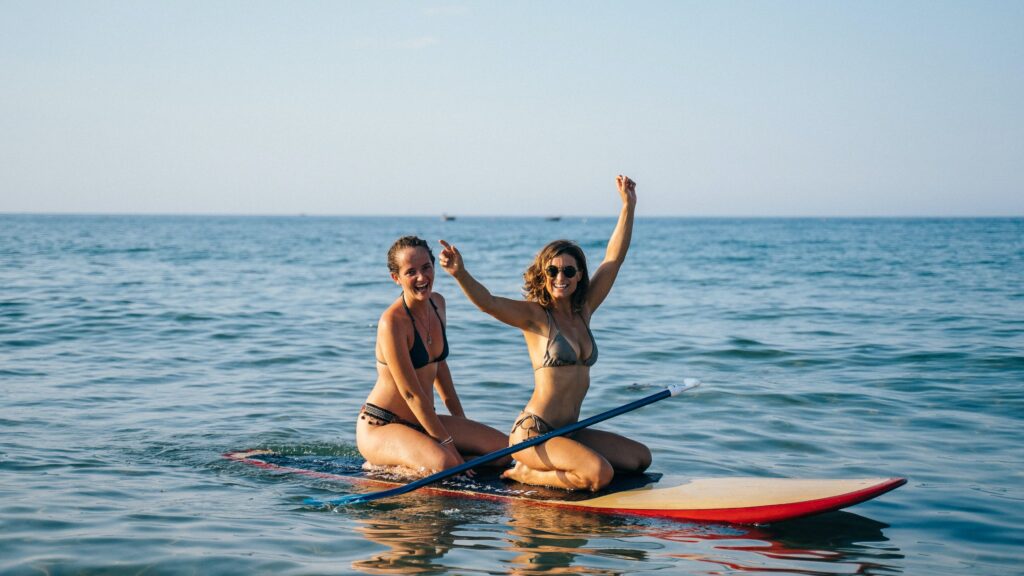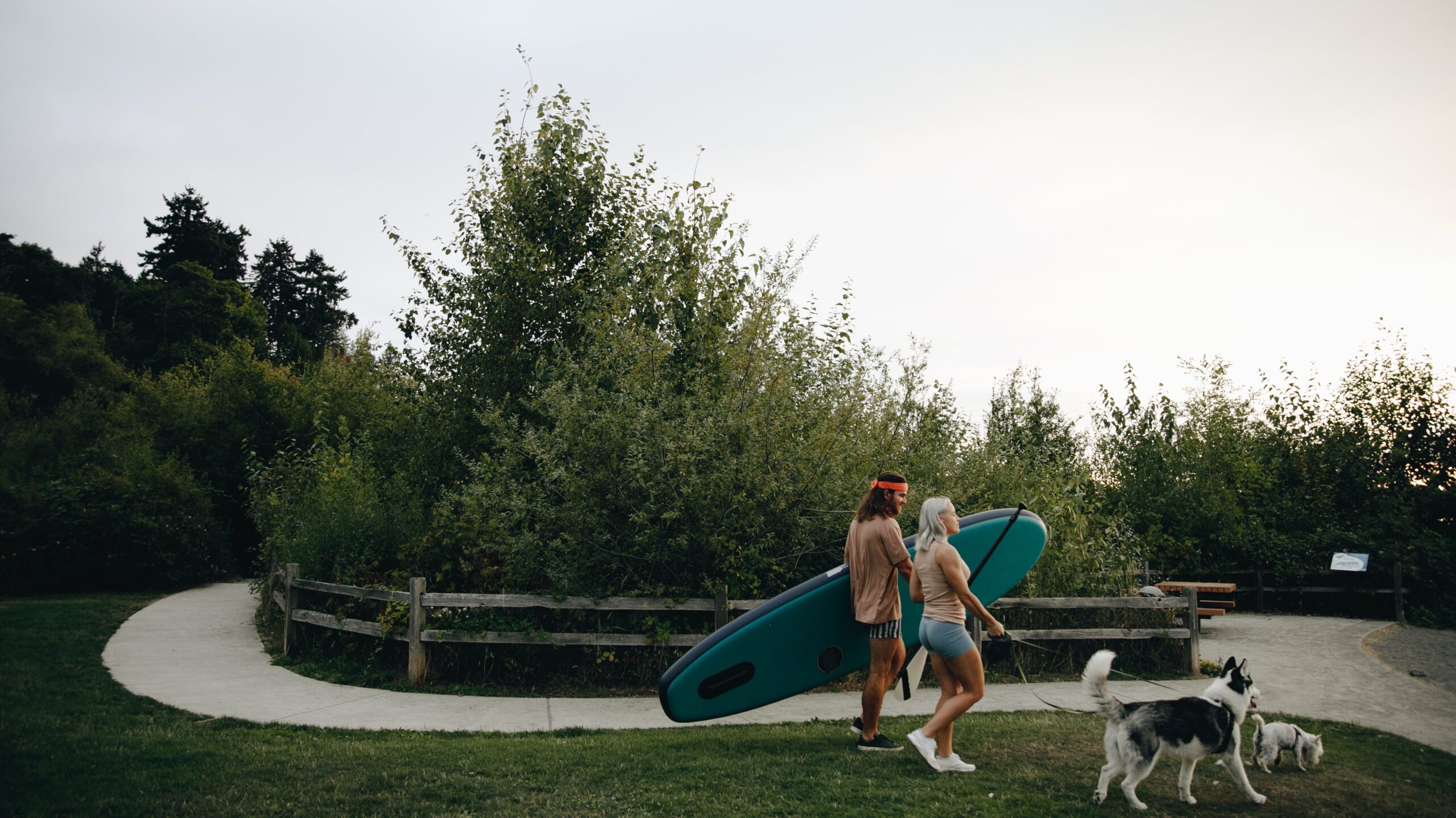
Table of Contents
Paddle boarding, also known as stand-up paddle boarding (SUP), has gained immense popularity over the past few years. As you watch seasoned paddlers gliding gracefully on serene waters, you might wonder, “Is paddle boarding hard?” The answer isn’t as straightforward as you might think.
In this comprehensive guide, we’ll explore the world of paddle boarding and provide insights into its accessibility, challenges, and rewards. Whether you’re a complete beginner or have some experience, this article will offer valuable information to help you on your paddle boarding journey.
I. Is Paddle Boarding Hard for Beginners?
Embarking on the journey of paddle boarding may appear daunting to newcomers, but beneath the surface, this water sport reveals itself as exceptionally welcoming to beginners. Let’s delve deeper into the reasons why paddle boarding stands out as an ideal choice for those taking their first strokes into this aquatic realm.
Balance and Stability
At first glance, the prospect of standing on a board atop the water might raise concerns about balance. Yet, the reality is that paddle boarding demands a reasonable but manageable degree of balance. While finding your equilibrium might present an initial challenge, it’s a hurdle that most novices overcome surprisingly quickly.
Learning Curve
One of the standout features of paddle boarding is its gentle learning curve. Unlike some water sports that demand prolonged training, you can find comfort on your board within a single session. As you progress, refining your technique becomes a natural part of the journey, boosting your confidence with each stroke.
Calm Waters
Beginners often set out on paddle boards in tranquil, flat waters, providing an optimal environment for mastering the basics. This setting eliminates the complexities of dealing with formidable waves or robust currents, allowing novices to acclimate to their boards with ease.
Versatility in Experience
While the initial focus may be on stability and foundational skills, paddle boarding offers a versatile range of experiences. As beginners progress, they can explore various water conditions, from serene lakes to gently flowing rivers. This adaptability allows paddle boarders to gradually expand their horizons, transforming their introductory experiences into a stepping stone for more diverse and exciting aquatic adventures.
Beyond the technical aspects, paddle boarding embraces a sense of community. Enthusiasts often share tips, encouragement, and stories, creating a supportive network that fosters a positive learning environment. Whether connecting with fellow beginners or seasoned paddlers, the camaraderie within the paddle boarding community adds a valuable dimension to the overall experience.
II. Challenges of Paddle Boarding
While paddle boarding extends a friendly invitation to beginners, it’s vital to acknowledge the challenges that may arise as you delve into this water sport. Exploring the intricacies of why paddle boarding might present difficulties helps in preparing enthusiasts for a more nuanced understanding of the journey.
Paddling Techniques
Efficiency in paddling is a cornerstone of an enjoyable paddle boarding experience. However, mastering the art of efficient paddling involves a learning curve. Different strokes are necessary for turning, maintaining balance, and gliding through the water effortlessly. Dedication to refining these techniques through practice is key to overcoming this challenge.
Environmental Factors
The paddle boarding experience is intimately tied to environmental conditions. Wind, currents, and waves add layers of complexity, making paddling more demanding. Understanding how to navigate and adapt to these ever-changing conditions is essential for paddlers seeking to elevate their skills and embrace a broader range of aquatic environments.
Physical Exertion
While paddle boarding is renowned for its accessibility, it also demands a level of physical exertion. This sport offers an excellent full-body workout, contributing to its popularity. However, this benefit comes with the prerequisite of a baseline physical fitness level. Building strength and endurance becomes crucial, especially for those embarking on more extended journeys where physical resilience plays a significant role.

III. Making Paddle Boarding Easier
If the perceived difficulty of paddle boarding gives you pause, fret not – there are effective strategies to make this aquatic adventure more accessible and enjoyable for all. Let’s explore key approaches to enhance your paddle boarding experience.
Take Lessons
Embark on your paddle boarding journey with the guidance of certified instructors. These experts offer valuable lessons, teaching you not only the proper techniques but also essential safety measures. Building your skills under expert supervision instills confidence, ensuring a smoother transition into the world of paddle boarding.
Choose the Right Equipment
Selecting the appropriate board is paramount to your paddle boarding experience. Boards come in various types, each catering to different skill levels and purposes. Thorough research and seeking advice from experts will aid you in making an informed decision, aligning the board with your proficiency and intended use.
Practice Regularly
As with any skill, practice remains a fundamental aspect of paddle boarding mastery. Initiate your journey on calm waters, gradually progressing to more challenging conditions as your confidence and proficiency grow. Consistent practice not only enhances your comfort level but also refines your skills for a more enjoyable experience.
IV. The Reward of Paddle Boarding
As you ponder the question, “Is paddle boarding hard?” redirect your attention to the myriad rewards and transformative benefits awaiting those who embrace this waterborne pursuit.
Connection with Nature
Embark on a paddle boarding journey to forge a profound connection with nature. Whether navigating serene lakes, meandering rivers, or coastal waters, you’ll find solace and appreciation for the environment. Paddle boarding provides a unique vantage point to witness the wonders of the natural world.
Physical Fitness
Discover the joys of a comprehensive full-body workout through paddle boarding. Engaging your core, legs, arms, and back muscles, this low-impact activity accommodates various fitness levels. While relishing the tranquility of the water, you’re simultaneously enhancing your physical well-being through dynamic and invigorating exercise. Want to know how many calories you burn while paddleboarding? Check out this handy guide: Calories Burned Paddleboarding
Relaxation and Mindfulness
Beyond the physical rewards, paddle boarding on calm waters contributes to mental well-being. The rhythmic motion of paddling becomes a meditative exercise, reducing stress and fostering relaxation. Allow the soothing embrace of the water to create a mindfulness experience that transcends the ordinary.
Adventure and Exploration
For the spirited adventurer, paddle boarding unfolds a realm of possibilities. It’s not merely a water sport; it’s an avenue for exploration. Navigate through hidden coves, reach secluded spots, and unveil the beauty of places often untouched. Paddle boarding invites you to embark on an adventurous journey, expanding your horizons with each stroke.
V. Conclusion
As the sun sets on the rippling waters, leaving behind the silhouette of paddle boarders gliding gracefully, the lingering question echoes: Is paddle boarding hard? This comprehensive guide unravels the layers of paddle boarding, from the initial balancing act to the rewards of forging a profound connection with the aquatic realm
For beginners, the prospect of standing atop a board on water may spark uncertainties. Yet, paddle boarding proves to be exceptionally welcoming. The manageable learning curve, emphasis on balance, and initiation in calm waters create an ideal environment for novices to find their aquatic footing.
While the journey into paddle boarding opens with a tranquil invitation, challenges inevitably emerge. Paddling techniques demand dedication and practice, environmental factors introduce nuances, and physical exertion becomes a vital aspect of this full-body workout. Acknowledging these challenges unveils the sport’s depth and complexity.
Is Paddle Boarding Hard
So, is paddle boarding hard? It is a question answered not in absolutes but in the rhythmic strokes, the serene waters, and the transformative journey that awaits those willing to step onto the board and embrace the tranquil adventure that is paddle boarding.
To those hesitant about the perceived difficulty, strategies abound to make paddle boarding an accessible and enjoyable pursuit. Lessons from certified instructors, choosing the right equipment, and consistent practice are pivotal elements to smooth the waters for an enriching paddle boarding experience.
Dive into the serene world of paddle boarding with our comprehensive guide on how to get started. From mastering the basics to conquering challenges, discover the key insights that will make your paddle boarding journey not only accessible but truly enjoyable.

